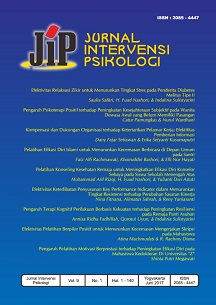Main Article Content
Abstract
The purpose of this study was to evaluate the effectivity of Adolescent Health Counseling Training in improving peer counselor self-efficacy on high school students. There were three participants enrolled this
study.Peer counselor self-efficacy was measured by using self-efficacy scale. Data were analyzed using nonparametric Wilcoxon test
to see differences in peer counselor self-efficacy before and after intervention. The result show no significant effect of Adolescent Health Counseling Training in Improving peer Counselor (p=0,150). Qualitative analyzed showed that self-efficacy of peer counselor improves peer counselor self-efficacy after intervention.
Keywords: Peer Counselor, Adolescent Health Counseling Training, Self-Efficacy
Article Details
Copyright (c) 2017 Authors

This work is licensed under a Creative Commons Attribution-ShareAlike 4.0 International License.
Authors who publish with this journal agree to the following terms:
- Authors retain copyright and grant the journal right of first publication with the work simultaneously licensed under a Creative Commons Attribution-ShareAlike 4.0 International License that allows others to share the work with an acknowledgment of the work's authorship and initial publication in this journal.
- Authors are able to enter into separate, additional contractual arrangements for the non-exclusive distribution of the journal's published version of the work (e.g., post it to an institutional repository or publish it in a book), with an acknowledgment of its initial publication in this journal.
- Authors are permitted and encouraged to post their work online (e.g., in institutional repositories or on their website) prior to and during the submission process, as it can lead to productive exchanges, as well as earlier and greater citation of published work (See The Effect of Open Access).
References
- Astiti, N.M. (2011). Hubungan faktor pelatihan kesehatan reproduksi dengan implementasi pasca pelatihan pada konselor sebaya kesehatan reproduksi remajadi Provinsi Bali. Tesis (tidak dipublikasikan). Denpasar: Program Magister Program Studi Ilmu Kesehatan Masyarakat Universitas Udayana.
- Bandura, A. (1997). Self-efficacy: The exercise of control. New York: W.H. Freeman and Company.
- Feist, J. & Feist, G.J. (2008). Theories of personality. Yogyakarta: Pustaka Pelajar.
- Geldard, K. (2014). Konseling remaja intervensi praktis bagi remaja beresiko. Yogyakarta: Pustaka Pelajar.
- Kementrian Kesehatan RI. (2013). Pedoman Standar Nasional Pelayanan Kesehatan Peduli Remaja (PKPR). Jakarta: Kementrian Kesehatan RI.
- Kementrian Kesehatan RI. (2013). Pedoman teknik konseling kesehatan remaja bagi konselor sebaya. Jakarta: Kementrian Kesehatan RI.
- Santrock, J.W. (2002). Life-span development. Jakarta: Erlangga.
- Seniati, L., Yulianto, A., & Setiadi, B.N. (2015). Psikologi eksperimen. Jakarta: Indeks.
- Suwarjo. (2008). Konseling teman sebaya (peer counseling) untuk mengembangkan resiliensi remaja (makalah disampaikan dalam Seminar Pengembangan Ilmu Pendidikan Fakultas Ilmu Pendidikan Universitas Negeri Yogyakarta tanggal 29 Februari 2008.
- Tiego, M.P & Kamore, S.K. (2015). Four Pillars of effectiveness of peer counselling programs in Meru South District High Schools, Kenya. Intervational Journal of Humanities and Sosial Science, 5(2), 254-262.
- Wulandari, S. (2013). Hubungan antara hubungan antara efikasi diri dan stres akademik pada siswa Sekolah Menengah Atas (SMA) yang mengikuti program akselerasi. Skripsi. Yogyakarta: Universitas Islam Indonesia.
References
Astiti, N.M. (2011). Hubungan faktor pelatihan kesehatan reproduksi dengan implementasi pasca pelatihan pada konselor sebaya kesehatan reproduksi remajadi Provinsi Bali. Tesis (tidak dipublikasikan). Denpasar: Program Magister Program Studi Ilmu Kesehatan Masyarakat Universitas Udayana.
Bandura, A. (1997). Self-efficacy: The exercise of control. New York: W.H. Freeman and Company.
Feist, J. & Feist, G.J. (2008). Theories of personality. Yogyakarta: Pustaka Pelajar.
Geldard, K. (2014). Konseling remaja intervensi praktis bagi remaja beresiko. Yogyakarta: Pustaka Pelajar.
Kementrian Kesehatan RI. (2013). Pedoman Standar Nasional Pelayanan Kesehatan Peduli Remaja (PKPR). Jakarta: Kementrian Kesehatan RI.
Kementrian Kesehatan RI. (2013). Pedoman teknik konseling kesehatan remaja bagi konselor sebaya. Jakarta: Kementrian Kesehatan RI.
Santrock, J.W. (2002). Life-span development. Jakarta: Erlangga.
Seniati, L., Yulianto, A., & Setiadi, B.N. (2015). Psikologi eksperimen. Jakarta: Indeks.
Suwarjo. (2008). Konseling teman sebaya (peer counseling) untuk mengembangkan resiliensi remaja (makalah disampaikan dalam Seminar Pengembangan Ilmu Pendidikan Fakultas Ilmu Pendidikan Universitas Negeri Yogyakarta tanggal 29 Februari 2008.
Tiego, M.P & Kamore, S.K. (2015). Four Pillars of effectiveness of peer counselling programs in Meru South District High Schools, Kenya. Intervational Journal of Humanities and Sosial Science, 5(2), 254-262.
Wulandari, S. (2013). Hubungan antara hubungan antara efikasi diri dan stres akademik pada siswa Sekolah Menengah Atas (SMA) yang mengikuti program akselerasi. Skripsi. Yogyakarta: Universitas Islam Indonesia.





